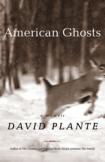Blooming Where Planted
David Plante was born in Providence, R.I., in 1940, the next to last of the seven sons of Anaclet and Albina Plante, French-Canadians who were called, somewhat sneeringly in Yankee New England, Canucks. Anaclet was a stoical, taciturn, quarter-breed Blackfoot Indian who worked humbly for a manufacturer of industrial files and voted Republican because he knew that the Irish, who were disdainful of the French, led the Democratic Party. Albina was as jocular as he was not, and a skeptical, secular, practicing Catholic who could say to her son, Between you and me and the lamppost, I don’t think we go anywhere when we die, and I know for sure that once we die we can’t come back as ghosts.
At the age of 7, David was frequently frightened that the ghost of a forest Indian would scowl at him through his window at night. His Jansenist school days in the French-speaking parish of Notre Dame de Lourdes would haunt him into his 50’s; even his first novel about five young Americans who, without history, politics, or religion, floated in an unattached world, was titled The Ghost of Henry James. There is an inevitability to the title of his memoir.
After a freshman year at Boston College, where he felt himself a stranger in a strange land, Mr. Plante went to Belgium to study at the Catholic University of Louvain. I had come to Europe to be free of the American God, he writes, but, to my horror, my Canuck God, who I’d thought had disappeared altogether, became exposed like a ghost on his visit to an old gray stone church that smelled of incense and dampness.
Seeking out in Spain an African-American lounge singer named Gloria whom he had met on his transatlantic voyage, Plante was introduced to a handsome Hungarian-Greek whose homeland was Turkey and who Gloria wrongly guessed was interested in her. Initiated into homoerotic sex by öçiGloria called him ArchiePlante fell desperately in love, only to be coolly resisted by the libertine.
There followed five neurotic years in New York City, which Plante calls a total failure, because I became possessed by people who rejected my attempts at possessing them and, more, because I rejected, with a crudeness I had never imagined I was capable of, those people who seemed to be possessed by me. I had fantasies of killing or being killed.
Retreating to Boston, he found a room in a house on Beacon Hill, taught English to foreigners and, reading the novels of Henry James, which became a world to me, found himself longing to return to Europe. By the age of 26, he had saved $3,000 and could travel to London, which he chose because öçi was there. Invited to have tea with Nikos Stangos, a Communist, Greek Orthodox former graduate student in philosophy at Harvard, Plante’s first thought on meeting him was: Oh, yes. Within the week, Stangos asked him to live with him, and they have been life partners ever since.
And in England Plante stayed, acquiring British citizenship, visiting America only for various half-year stints at universities. He strangely failed to return for the funerals of his father, his mother or his beloved and crazily pious Aunt Cora, who was granted her final wish to be buried in the nun’s habit she had hanging in her closet since her youth.
Consumed by hypergraphia, the overwhelming desire to write, David Plante has filled shelves of diaries with millions of words, millions of images in words, in my attempt to get everything in. Almost incidentally, he has published 13 critically acclaimed novels, including the Francoeur trilogy of The Family, The Country and The Woods, and the nonfiction account Difficult Women: A Memoir of Three, about Jean Rhys, Sonia Orwell and Germaine Greer.
Sonia, the widow of George Orwell, is here a destructive, denouncing tyrant who rejected God, any God, with a force that would have destroyed God had God existed.
Counterpoised to Mrs. Orwell is Plante’s good friend, the American Catholic novelist Mary Gordon, who introduced him to the Kol Nidre service, in which Jews asked forgiveness for their sins. She then invited him to a moving Ash Wednesday liturgy at Holy Cross Church on West 42nd Street in New York City. Wobbling in his atheism afterwards, he listened as Mary Gordon insisted, What you long for exists in the very longing for it.
Blocked by his past, Plante stubbornly replied, Any longing I have that remains with me from the time when I did believe I find silly, just silly, and I won’t tolerate the silliness in me.
And yet his faith quest persisted as he sought a religious revelation in tunneling through twelve generations of his ancestry in the archives of La Rochelle, France. I wanted to find, in whatever information was available to me, evidence of the syncretism that so attracted me, the sense that everything does...connect. But the only sense of a divinity I left La Rochelle with was the divinity of awareness.
This fine, introspective memoir is not strictly an autobiography. His six brothers are allotted only one page; there is no mention of his book editors or his fictional aims and successes; and some ordinary facts of his life are only fleetingly touched on (whether or not he graduated from Boston College is still a mystery to me). But as a heedful exploration of a psyche, a record of a vulnerable, likeable man’s encounters with his memories and a candid, unprotected disclosure of the wrestling between flesh and spirit, American Ghosts may be unsurpassed.
This article also appeared in print, under the headline “Blooming Where Planted,” in the April 4, 2005, issue.








